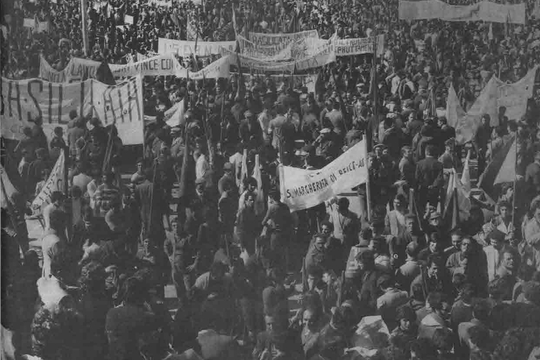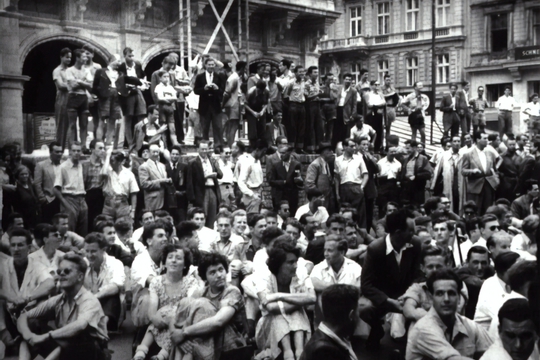V.I. Lenin - Questionnaire (1894/5)

theory
V.I. Lenin - Questionnaire (1894/5)
by
V.I. Lenin
/
July 9, 2022
in
Karl Marx's Workers Inquiry
(#14)
Chapter Nine
This Questionnaire on the Situation of Workers in Enterprises was composed by Lenin in 1894 for distribution amongst factory workers in St Petersburg.1 The document appears in Harding and Taylor’s 1983 text: Marxism in Russia: Key Documents 1879-1906, kindly brought to my attention by Marcelo Hoffman.
The reproduction below includes, from the same text, a recollection of I.V. Babushkin, a contemporary worker-organiser involved in a study circle with Lenin which later became the League of Struggle for the Emancipation of the Working-Class. Geared towards organising factory workers, the League was a significant predecessor to the Russian Social Democratic Labour Party.
This questionnaire is not included in the Russian editions of Lenin’s Sochineniya nor in the English Collected Works but its attribution to Lenin is confirmed by the memoirs of Ivan Babushkin in Vospominaniya o Vladimire Iliche Lenine (3 vols., Moscow, 1956-60), 1, p. 114. Babushkin recalled how:
the lecturer [Lenin] gave us lists of previously prepared questions which prompted us to make a closer study and observation of factory and mill life. During working hours we found excuses to go into another shop to collect material, either by personal observations, or, where possible, in conversation with the workers.
My tool box was always full of notes of all kinds; during the dinner-hour I tried to write up the data on hours and wages in our shop.
See also Recollections of I. V. Babushkin (Moscow, 1957), p. 56.2
QUESTIONNAIRE ON THE SITUATION OF WORKERS IN ENTERPRISES (1894/5)
V.I. Lenin
- The number of workers in the institution - men, women, adolescents, children, the total number.
- When and how long the employment is for, or if it is without a definite term. Is there anything special about it? (Employment through a contractor, the district authorities, an artel3, etc.)
- Does the owner break the terms of employment before their term has expired, e.g. by paying less?
- Do workers leave the employer before their term has expired? In droves or one at a time? How does the owner react? Does he complain to a court or to an inspector, does he protest to other owners?
- How many hours a day does the work last? Is there night and holiday work? Always or from time to time? How are the shifts arranged? Is there frequently work outside hours? Can one refuse to work on holidays and outside hours?
- Information on monthly output. The number of workers. The jobs given to men and women. Working together or apart? The monthly output: of the ordinary worker, the skilled worker, the slow worker. Who provides the food? Who provides the quarters? Is it piece-work, or is it done by day or by month?
- How much higher is the pay for holiday or out-of-hours work?
- How many times a month are wages paid out and in what manner: in cash, in goods, in shop tokens? Are there any abuses in the payment (delays, miscalculations, etc.)?
- Have the wages recently been increased or reduced? If so, what explanation has been given?
- Deductions from wages in roubles and kopeks: to the artel, the shops, for arrears.
- A list of fines. In round numbers how much a month does this affect the individual? Are there irregularities in the penalties?
- How do the masters and owners treat the workers? Give examples.
- Is there dissatisfaction among the workers with conditions in the factory? How is this dissatisfaction manifested? Revolts. Is it possible to give more details of all the strikes in this institution or in others in which [the workers] have participated, or about which they have known: when, for what reason, how many people took part, how it went - peacefully or violently, were the army called in, how did it end - whether it was a success or a failure and why it ended as it did?
- Are the factory laws of any use to the workers? What kind of man is the factory inspector? How does he treat the workers? Give some of his actions as an example.
- Are there factory shops and consumers’ cooperatives in the institution? If yes, give the following figures: what are the prices on the open market and in the factory shop for rye-flour, high quality wheat, salt beef, lard, eggs, milk, potatoes, sugar, salt, kerosene etc.?
- As far as the worker, single and married, is concerned [the cost] per month [of]: accommodation, food (in artels and individually), heating, light, and per year: taxes, debt loan payments, clothing, shoes, tobacco, vodka?
-
Harding, N. and Taylor, R. (1983) Marxism in Russia: Key Documents 1879-1906, Cambridge: Cambridge University Press, p. 138-139. ↩
-
Harding, N. and Taylor, R. (1983) Marxism in Russia: Key Documents 1879-1906, Cambridge: Cambridge University Press, p. 383. ↩
-
An “artel” is a cooperative association. ↩
Featured in Karl Marx's Workers Inquiry (#14)
author
V.I. Lenin
Subscribe to Notes from Below
Subscribe now to Notes from Below, and get our print issues sent to your front door three times a year. For every subscriber, we’re also able to print a load of free copies to hand out in workplaces, neighbourhoods, prisons and picket lines. Can you subscribe now and support us in spreading Marxist ideas in the workplace?
Read next

Workers’ Responses to the Inquiry
by
Clark McAllister
/
July 9, 2022

